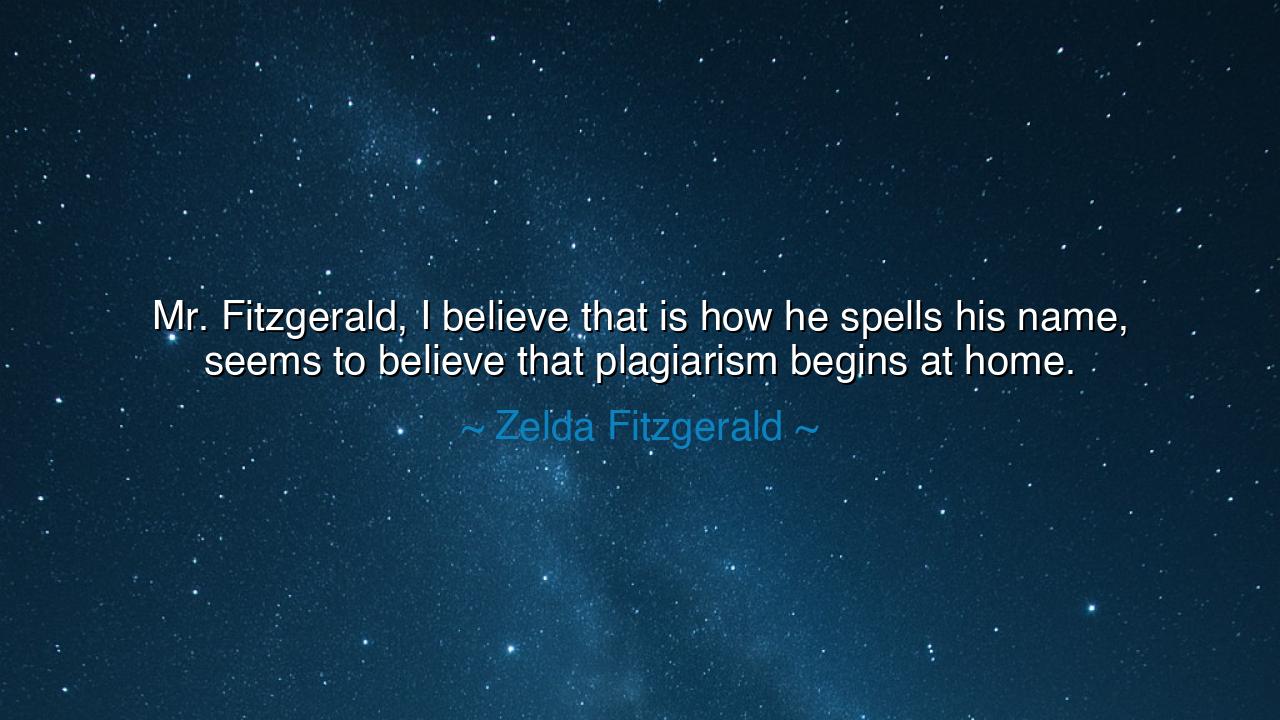
Mr. Fitzgerald, I believe that is how he spells his name, seems
Mr. Fitzgerald, I believe that is how he spells his name, seems to believe that plagiarism begins at home.






In the words of Zelda Fitzgerald, a woman both brilliant and burdened, there burns the spark of wit and wounded pride: “Mr. Fitzgerald, I believe that is how he spells his name, seems to believe that plagiarism begins at home.” At first, her tone dances with irony, yet beneath the laughter lies the sting of betrayal — the cry of a woman whose creativity was eclipsed, whose voice was borrowed by the man history hailed as genius. This quote, though brief, is a window into the storm of love and rivalry that defined Zelda and F. Scott Fitzgerald, two spirits bound by brilliance and destruction. Her words, playful yet bitter, are not merely a jab at her husband; they are a testament to the ancient struggle between inspiration and ownership, between love’s union and the sovereignty of the self.
To understand her meaning, we must first glimpse the life from which it sprang. Zelda Sayre Fitzgerald was not merely the wife of a literary giant — she was a writer, dancer, and artist, aflame with her own creative fire. Yet in the shadow of her husband’s fame, her ideas and words often found themselves absorbed into his novels, her diaries and letters echoing through the voice of his heroines. When she accused him of believing that “plagiarism begins at home,” she spoke not only of theft, but of erasure — the pain of seeing her truth retold in another’s voice. Hers was the lament of the silenced, the cry of one who gives her soul to love and art, only to see both claimed by another.
The origin of this remark lies in the tumultuous years of the Fitzgeralds’ marriage. F. Scott, the celebrated author of The Great Gatsby and Tender Is the Night, often drew upon their shared experiences — their parties, quarrels, and even Zelda’s private writings — as raw material for his fiction. Zelda, who longed to carve her own path, found herself trapped in the dual role of muse and victim. When she wrote her own novel, Save Me the Waltz, Scott accused her of using material he had intended for his next book. Thus, love became competition, and admiration turned to bitterness. Her remark, sharp as a blade, was both defiance and despair — the voice of a woman reclaiming her name in a world that had folded her identity into another’s.
Yet, there is a wisdom here that transcends her personal sorrow. Zelda’s words speak to the ancient conflict between creation and possession. In every age, the artist has faced the temptation to draw too deeply from the lives of others — to blur the line between influence and appropriation. The Greeks told of Prometheus, who stole fire from the gods to give light to mankind, and was punished for his theft. So too, in art, one may take inspiration from life, but there is a sacred boundary between drawing from another’s flame and stealing their light. Zelda’s accusation reminds us that even love cannot justify the theft of identity — that the truest creation must come not from possession, but from respect for the independence of every soul.
Consider, too, the tragedy of Camille Claudel, the sculptor and lover of Auguste Rodin, whose genius was long hidden beneath his shadow. Like Zelda, she gave her life to art and love, yet found her legacy diminished, her creations attributed to another. Both women stood in a world that celebrated male brilliance while consuming the gifts of women as its unseen fuel. Their stories, though centuries apart, reveal a truth as old as humanity itself — that creation, when unbalanced by equality, becomes consumption. Zelda’s words, laced with irony, thus carry the weight of all those whose voices were swallowed by another’s story.
Yet even within her bitterness, there is a fierce dignity. By speaking her truth, Zelda refused to be erased. Her words are the voice of the self awakening, the artist reclaiming her own narrative. They remind us that the bond between lovers, friends, or collaborators must never become a chain. To create together is divine — but to take without acknowledgment is to wound the sacred trust that binds one heart to another. True art does not demand ownership; it invites dialogue. It honors the source while shaping something new.
And so, the lesson of Zelda Fitzgerald’s words is not merely one of grievance, but of freedom. Guard your voice. Honor the voices of others. In love and in art, give without erasing, share without consuming. Let admiration inspire, not imprison. For every soul has its own music, and when one steals another’s song, both are silenced. As Zelda teaches us, creation born of respect becomes legacy — but creation born of theft becomes tragedy.
Thus, let us remember: to love deeply is noble, to learn from others is wise, but to take what is not ours — even in the name of affection or art — is to betray both love and truth. Plagiarism, whether of words or of spirit, begins not in the home, but in the heart that forgets to honor what it has borrowed.






AAdministratorAdministrator
Welcome, honored guests. Please leave a comment, we will respond soon